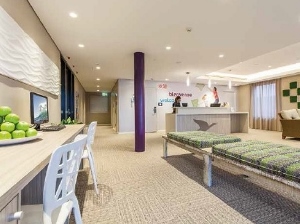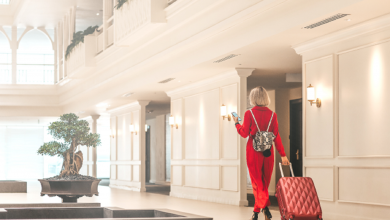
Franchising in a high profile accommodation chain – a good idea or not?
In Australia, the conundrum for administrators of hotels or motels of whether to become a member of a recognised accommodation chain or to remain independent, has aroused vigorous debate in recent years.
Those owning or managing an accommodation business can usually see advantages on both sides. On one side, franchising has proved to be one of the most dynamic business methods of the past half-century, especially in the accommodation industry. Becoming a franchisee of a well-known brand can undoubtedly deliver several benefits of size and strength that will always be a struggle for independents to achieve.
But that necessarily means largely adapting to the group requirements, which some regard as unwanted loss of independence. And of course, with franchising, there is a financial cost involved in obtaining membership. There will always be those who prefer to go their own way, saving their membership fee to market their property as they see fit and perhaps relying much more on word of mouth about their own particular brand of service to their customers.
Particularly in isolated areas where there is little or no competition from the big players, some property administrators might see few advantages in becoming part of a major chain. Alternatively, in areas where the competition is fierce, it might well be a case of ‘join a chain or die’.
Whatever they decide, there is no doubt that since the 1960s, franchising has become a global phenomenon. In the USA alone, it is a US$2 trillion industry while in Australia, sales by franchised businesses now exceed $130 billion per annum.
But nowhere has franchising proved more popular than in New Zealand which is served by around 430 franchise systems operating more than 450 brands, giving it the highest proportion of franchises per capita in the world. It has been growing rapidly. Despite recessionary times, the total number of franchised units increased by 5.3 per cent in this country from 2009 to 2010. At least in part, this was probably prompted by the recession itself and the resulting demand from travellers, especially corporates, for lower-cost accommodation. Figures in Australia reflect this.
Franchising boom – In the accommodation industry, the need to be part of a brand and all the additional benefits that accrue from it has seen franchising in Australia and New Zealand boom, the increased interest largely driven by the success and calibre of the brands themselves.
It gives those who wish to be self-employed the ability to go into business properly trained and equipped, with the security of a well proven product and system behind them. A franchise chain provides an automated central reservation system and a nationally recognised brand that assures consumers that rooms and amenities meet a consistent minimum standard.
For the operators, joining a well-known brand helps them capture travellers through international advertising and marketing. This is particularly important in smaller travel markets, such as Australia where overseas guests make up a major part of their business.
So, what are the options for becoming a franchisee of a recognised accommodation chain in Australia?
 |
| ibis Styles The Entrance |
Accor Pacific’s vice president of franchise and strata, Dino Mezzatesta, sees numerous advantages for prospective membership of Accor brands, such as increased exposure to powerful international marketing channels, loyalty programs and generally enhanced support in running their business.
“As independent hotel operators are often situated in suburban and regional areas, they can be heavily reliant on a number of market segments to make their businesses profitable. When market conditions shift or there is a downturn, it can be very challenging for operators to contain their costs,” Mr Mezzatesta said.
“That’s why a franchising model with an internationally recognised brand such as Accor, combined with the strength of the group’s global distribution and loyalty programs, can assist independent operators to capture new business while maintaining their own operational management style. Accor’s franchising model offers this support to help independent operators grow and Accor is very much focused on developing long-standing relationships with franchisees.
“While the majority of regional properties are motels, through the rebranding process and adhering to Accor’s international brand standards and guidelines, the property can come under the category of hotel and receive all the benefits of operating under a globally recognised hotel group,” Mr Mezzatesta said.
Possible finance options – For those independents interested in becoming a franchisee, are there finance options available and if so, what are they?
Mr Mezzatesta says that while there are a number of finance options in the marketplace, it is not something that Accor provides under its franchise agreements.
“However, once a franchisee comes on board with Accor Hotels, we have a fully resourced team to provide franchisees with the guidance and tools they need to manage the hotel brand with the flexibility of being an individual business owner/operator,” he said.
When deciding whether to become a part of a franchise brand, those in charge of the applicant property will have to settle on the kind of franchise best suits their property style. They will find plenty to ponder over with Accor.
“Our extensive brand portfolio is well placed to cater to many styles of hotels, from economy to luxury,” said Mr Mezzatesta. “The most popular franchising brands, particularly for regional properties, include Mercure and ibis Styles. For hotel owners who might be looking to re-invest in their existing properties or find a partner for a completely new offering with a new build, Accor’s upscale brands The Sebel and MGallery Collection brands are two of the fastest growing in the group’s franchise network.
Accor defines its franchising brands as:
Ibis Styles – the ‘all inclusive’ 3½ star Accor hotel brand with hotels embracing its own personality while sharing a common colourful, bright, energetic decor and brand spirit.
Mercure – a midscale hotel brand that combines the strength of an international network with a strong quality commitment, and the warm experience of hotels, all different, rooted in their local community and managed by enthusiastic accommodation providers.
Novotel – a network of modern, well-designed and efficient hotels, genuinely committed to every kind of traveller. Novotel has a 4-star international rating in the upper midscale segment, located in the heart of major international cities, business districts and tourist destinations, providing customers with the same high level of comfort, relaxation and well-being throughout the world.
The Sebel – a brand of premium hotels and apartments offering guests seeking a higher level of independence and control, an inspiring accommodation experience in stylish and spacious surrounds supported by exemplary, personable service that is both welcoming and knowledgeable.
MGallery – a collection of high-end, boutique hotels found in some of the most magnificent locations on earth. Each propety in the collection has its own personality and story, experienced by guests through its architecture, interior design and services. Hotels in the MGallery Collection also each offer a distinct memorable moment experience such as private tours and special dining events that can be arranged with the property.







